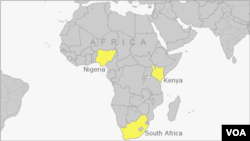NAIROBI —
Kenya is forging ahead with plans to build a nuclear power plant by 2025 as part of an ambitious development agenda. However, the project is not without its doubters, who wonder whether nuclear power is safe compared to other clean energy sources.
Students at the University of Nairobi are training for the jobs of the future -- at what is planned to be Kenya's first nuclear power plant.
The master's program at the Institute of Nuclear Science and Technology trains 15 students annually to be technicians and engineers.
Institute director David Maina said increasing power generation is key to Kenya's development.
"The kinds of things this country is imagining they want to do requires a lot of power. And here we have only 1,600 megawatts. What can we do, if you compare that to a country like [South] Korea which has 43,000 megawatts? You see we are a tiny consumer compared to those big economies," said Maina.
About 69 percent of Kenyans live in homes without electricity; one nuclear power plant could provide up to 1,000 megawatts of power for those homes.
At a recent meeting in Nairobi, stakeholders in the nuclear project discussed its feasibility, which requires major investment in infrastructure and security.
Deputy President William Ruto said developing nuclear power is more than just "thinking outside the box."
"Kenya's stated intention of using nuclear energy for electricity generation reflects the sort of thinking which can propel a country from relative mediocrity to the realms of greatness," said Ruto.
Many other developed nations have turned away from nuclear power following the disaster at Japan's Fukushima plant in 2011. Germany is scheduled to close all of its nuclear plants by 2022.
In Kenya too, there are those who fear a nuclear plant could invite a Fukushima-type of disaster, or be a target for terrorism.
On the windswept hills outside of Nairobi, another power project is under construction.
When completed, the Ngong Hills wind farm will provide some 50 megawatts of power -- much less than a nuclear plant.
Moses Ole Kinaiya, with the Maasai Integrated Development Initiative, said he'd prefer to see Kenya focus on projects like this.
"Renewable energy I think is more safe because for examples as you see the turbines here, they've been planted, they're producing power, it doesn't have any major health risks, it doesn't have any major even security risks because you just have a guard, nobody is necessarily targeting it in terms of creating mass destruction," said Kinayia.
Kenya is also developing projects for geothermal energy, coal and other sources of power.
While nuclear power may be the most productive source, it is also the most costly. The price tag for a single plant is more than $4 billion.
Students at the University of Nairobi are training for the jobs of the future -- at what is planned to be Kenya's first nuclear power plant.
The master's program at the Institute of Nuclear Science and Technology trains 15 students annually to be technicians and engineers.
Institute director David Maina said increasing power generation is key to Kenya's development.
"The kinds of things this country is imagining they want to do requires a lot of power. And here we have only 1,600 megawatts. What can we do, if you compare that to a country like [South] Korea which has 43,000 megawatts? You see we are a tiny consumer compared to those big economies," said Maina.
About 69 percent of Kenyans live in homes without electricity; one nuclear power plant could provide up to 1,000 megawatts of power for those homes.
At a recent meeting in Nairobi, stakeholders in the nuclear project discussed its feasibility, which requires major investment in infrastructure and security.
Deputy President William Ruto said developing nuclear power is more than just "thinking outside the box."
"Kenya's stated intention of using nuclear energy for electricity generation reflects the sort of thinking which can propel a country from relative mediocrity to the realms of greatness," said Ruto.
Many other developed nations have turned away from nuclear power following the disaster at Japan's Fukushima plant in 2011. Germany is scheduled to close all of its nuclear plants by 2022.
In Kenya too, there are those who fear a nuclear plant could invite a Fukushima-type of disaster, or be a target for terrorism.
On the windswept hills outside of Nairobi, another power project is under construction.
When completed, the Ngong Hills wind farm will provide some 50 megawatts of power -- much less than a nuclear plant.
Moses Ole Kinaiya, with the Maasai Integrated Development Initiative, said he'd prefer to see Kenya focus on projects like this.
"Renewable energy I think is more safe because for examples as you see the turbines here, they've been planted, they're producing power, it doesn't have any major health risks, it doesn't have any major even security risks because you just have a guard, nobody is necessarily targeting it in terms of creating mass destruction," said Kinayia.
Kenya is also developing projects for geothermal energy, coal and other sources of power.
While nuclear power may be the most productive source, it is also the most costly. The price tag for a single plant is more than $4 billion.






